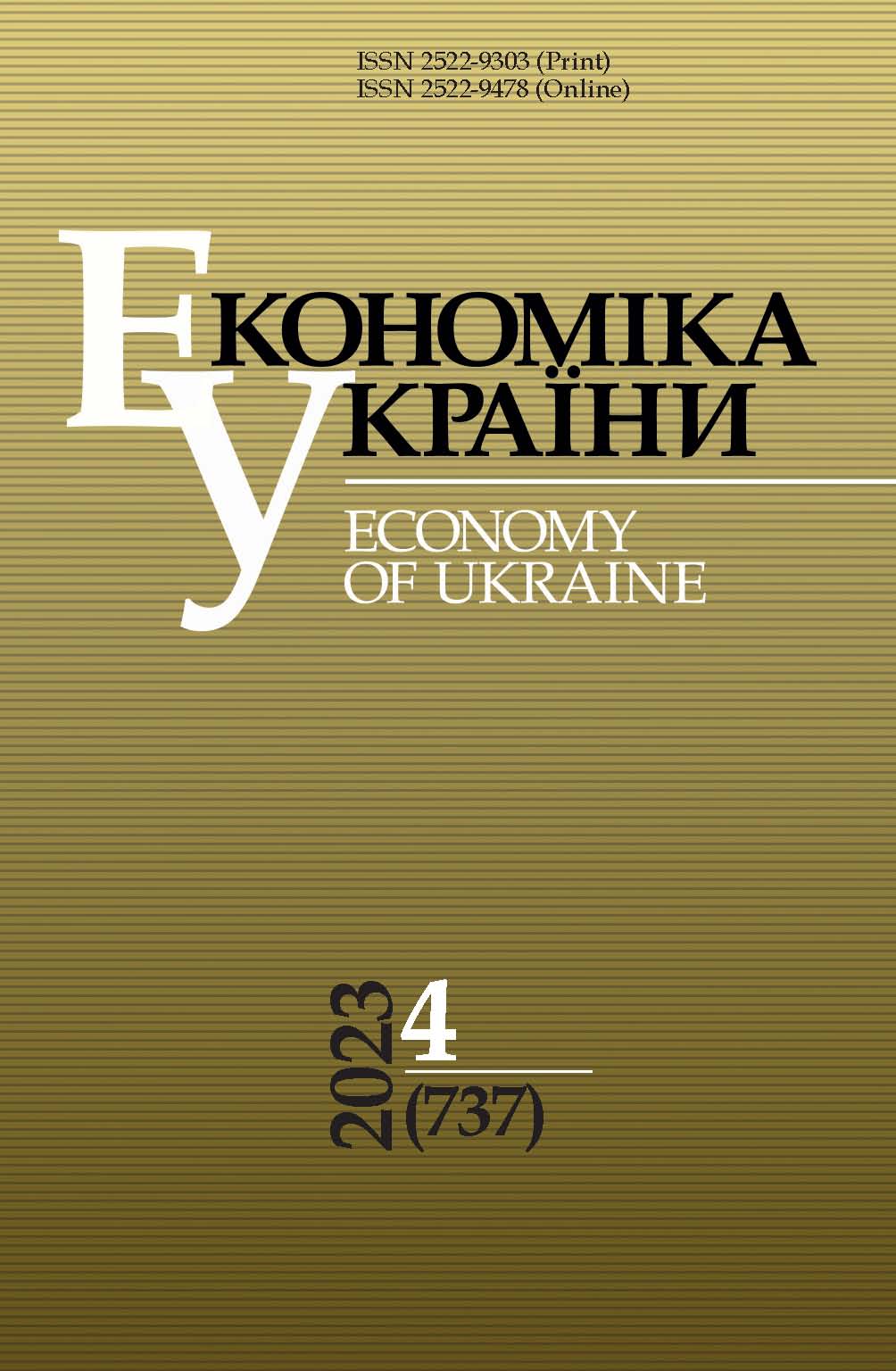ДО ПИТАННЯ ТЕОРІЇ І ПРАКТИКИ ПОЛІТИКИ СОЦІАЛЬНОЇ ЯКОСТІ В ПОВОЄННІЙ УКРАЇНІ
DOI:
https://doi.org/10.15407/economyukr.2023.04.003Ключові слова:
державна політика; соціальна якість; рівність; довіра; суспільні виміри; відновлення економіки; архітектура; фактори; механізми; викликиАнотація
Пошук складових політики і механізмів повоєнного відновлення й реконструкції економіки України є актуальним ще в період продовження бойових дій, адже світовий досвід і умови, які склались у світовій економіці на даний час, орієнтують на необхідність завчасного переосмислення очікуваної так званої "нової нормальності". Остання для України має як ендогенний, так і екзогенний виміри, і в повоєнний період у сфері життєдіяльності населення, функціонування держави, обороноздатності країни, діяльності бізнесу багато в чому визначатиметься умовами Угоди про асоціацію між Україною та ЄС. На шляху до повноцінного членства вона консолідуватиме суспільство в повоєнний час, а також відіграватиме організуючу роль у отриманні необхідних фінансових ресурсів. Саме на таких засадах, з огляду на майбутнє членство України в ЄС як основи внутрішньої і зовнішньої політики у сфері економіки та соціальної політики для вирішення питань повоєнного відновлення і розбудови економіки, обґрунтовано необхідність використання в Україні змісту, характеру, механізмів та індикаторів соціальної якості, яка формується на європейському континенті з кінця ХХ ст. Запропоновані засади політики соціальної якості як сучасного цілісного механізму забезпечення соціальної стабільності є результатом спільних розробок Інституту економіки та прогнозування НАН України і Міжнародної асоціації соціальної якості, які здійснюються протягом останніх п'яти років згідно з договором про творчу співпрацю.
Посилання
Beck W., Maesen L.J.G. van der, Thomese F., Walker A. (Eds.). Social Quality: A Vision for Europe. The Hague. London, Boston, Kluwer Law International, 2001.
Heiets V. Politico-economic foundations of research on the modern society. Economic theory, 2015, No. 3, pp. 5-13. URL: http://etet.org.ua/docs/ET_15_3_05_uk.pdf [in Ukrainian].
Heyets V. Social Quality in a Transitive Society: The Role of the State. The International Journal of Social Quality, 2019, Vol. 9, Iss. 1, pp. 32-50.
Smith A. The Theory of Moral Sentiments. M., 1997. URL: https://dahluniversitymanagementinstitute.files.wordpress.com/2016/08/s-1997.pdf [in Russian].
Maesen L.J.G. van der, Novakova Z., Ricceri M., Lin K., Heyets V., Corbett S. Ideas and Reflections About the Application and Elaboration of the Social Quality Approach (Sqa) in Central and Eastern European countries: The Case of Ukraine. Working Paper 17 (fourth edition). Amsterdam, 2019, Dec 17. URL: https://socialquality.org/wp-content/uploads/IASQ-Working-Paper-17-4.pdf
Walker A., Maesen L.J.G. van der (Eds.). Social Quality: From Theory to Indicators. NY, Palgrave Macmillan, 2012.
Beck W., Maesen L.J.G. van der, Walker A. The social quality of Europe. Policy Press, 1998. URL: https://www.amazon.com/Social-Quality-Europe-Wolfgang-Beck/dp/1861341121
Novakova Z. Four Dimensions of Societal Transformation: an Introduction to the Problematique of Ukraine. International Journal of Social Quality, 2017, Vol. 7, Iss. 2, pp. 1-29.
Maesen L.J.G. van der. Concluding Remarks. A “Social Quality Observatory” for Central and Eastern European Countries? International Journal of Social Quality, 2020, Vol. 10, Iss. 2, pp. 113-138. https://doi.org/10.3167/IJSQ.2020.100209
Walker A. The War in Ukraine and the Social Quality Perspective. IASQ Declaration about Ukraine Invasion. International Association on Social Quality, March 2022. URL: https://socialquality.org/about-iasq/ukraine-declaration/
Novakova Z.R., Maesen L.J.G. van der. Editorial: A Thematic Issue about Central and Eastern European Societies. International Journal of Social Quality, 2020, Vol. 10, Iss. 2, pp. VII-XXI.
Ferge Z. European Integration and the Reform of Social Security in the Accession Countries. European Journal of Social Quality, 2001, Vol. 3, No. 1/2, pp. 9-25. URL: https://www.jstor.org/stable/23973657
Juhász G. Exporting or Pulling Down? The European Social Model and Eastern Enlargement of the EU. European Journal of Social Quality, 2006, Vol. 6, No. 1, pp. 82-108. URL: https://www.researchgate.net/profile/Gabor-Juhasz-3/publication/233624949_Exporting_or_Pulling_Down_The_European_Social_Model_and_Eastern_Enlargement_of_the_EU/links/56d867ce08aebabdb40bf45a/Exporting-or-Pulling-Down-The-European-Social-Model-and-Eastern-Enlargement-of-the-EU.pdf
Heyets V., Blyzniuk V., Nykyforuk O. Topical aspects of social quality policy in the post-conflict economy of Ukraine. Economy of Ukraine, 2022, No. 6, pp. 3-22 [in Ukrainian].
Gordon D. Indicators of Social Quality: Applications in Fourteen European Countries. European Journal of Social Quality, 2005, Vol. 5, Iss. 1-2, pp. 1-7. URL: https://www.jstor.org/stable/23971886
Berman Y., Phillips D. Social Cohesion. In: Social Quality: From Theory to Indicators. Maesen L.J.G. van der, Walker A. (Eds.). London, Palgrave Macmillan, 2012, pp. 149-172.
Herrmann P. The Search for a Future Global Human Rights Agenda. International Journal of Social Quality, 2019, Vol. 9, Iss. 2, pp. 58-66. URL: https://www.researchgate.net/publication/340366919_The_Search_for_a_Future_Global_Human_Rights_Agenda
Mlachila M., Tapsoba R., Tapsoba S. A Quest for Quality. Finance & Development, 2015, Vol. 52 (2), pp. 14-17. URL: https://www.imf.org/external/pubs/ft/fandd/2015/06/pdf/mlachila.pdf
Joint Staff Working document. Association Implementation Report on Ukraine. European Commission. Brussels, 14.11.2017 SWD (2017) 376 final. URL: https://www.eeas.europa.eu/sites/default/files/association_implementation_report_on_ukraine.pdf
Heyets V.M. Socialization and its success in the model of achieving the development of the social world. Economic theory, 2021, No. 4, pp. 5-40 [in Ukrainian].
Wolf Judith R.L.M., Jonker I.E. Pathways to Empowerment: The Social Quality Approach as a Foundation for Person-Centered Interventions. International Journal of Social Quality, 2020, Vol. 10, Iss. 1, pp. 29-56.
Westbroek J., Nijhuis H., Maesen L.J.G. van der. Evolutionary Thermodynamics and Theory of Social Quality as Links between Physics, Biology, and the Human Sciences. International Journal of Social Quality, 2020, Vol. 10, Iss. 1, pp. 57-86.
Blyzniuk V.V. Institutional support of the inclusiveness of Ukrainian labor market. Economy and forecasting, 2020, No. 3, pp. 56-74 [in Ukrainian].
Metre L.V., Steiner S.E., Haring M. Ukraine’s internally displaced persons hold a key to peace. Atlantic Council, 2017, Oct 03. URL: https://www.atlanticcouncil.org/in-depth-research-reports/issue-brief/ukraine-s-internally-displaced-persons-hold-a-key-to-peace/
Heyets V.M. Institutional conditionality of endogenization of economic development. Journal of European Economy, 2018, Vol. 17, No. 2, pp. 155-166. URL: http://jeej.wunu.edu.ua/index.php/ukjee/article/view/1326 [in Ukrainian].
Artemenko I.A., Artemenko A.V. Ethical economy of M.I. Tugan-Baranovsky and economic ethics of post-socialist and world economy. In: M.I. Tugan-Baranovsky: scientific heritage and modern economic science. Proc. Int. Sci.-Pract. Conf. for the 150th anniversary of M.I. Tugan-Baranovsky (October 15–16, 2015). Ed. O.I. Davydov. Kharkiv, 2015, pp. 302-310. URL: http://dspace.puet.edu.ua/bitstream/123456789/3058/1/%d0%97%d0%b1%d1%96%d1%80%d0%ba%d0%b0.pdf [in Ukrainian].
Homann K., Blome-Drees F. Economic and Business Ethics. URL: http://krotov.info/lib_sec/22_h/hom/an0.htm [in Russian].
Shestakovskyi O.P., Bilous Ye.V. Basic cultural features of Ukrainian society and the possibilities of their use for socio-economic development. Ed. O. Balakiryeva. Kyiv, 2015. URL: http://ief.org.ua/docs/sr/285.pdf [in Ukrainian].
##submission.downloads##
Опубліковано
Як цитувати
Номер
Розділ
Ліцензія
Авторське право (c) 2024 Економіка України

Ця робота ліцензується відповідно до Creative Commons Attribution-NonCommercial-NoDerivatives 4.0 International License.



